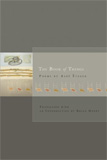October 10, 2012THE BOOK OF THINGS
Review by Adam Palumbo 
BOA Editions, Ltd
250 N. Goodman St. Suite 306
Rochester, NY 14607
ISBN: 9781934414415
2010, 95 pp., $16.00
www.boaeditions.org
Slovenian poet Ales Steger’s The Book of Things makes absurdish notions about, and through the eyes of, everyday objects all around us. These are dauntless, eccentric, and ambitious vignettes of verse that draw back the curtain and allow often-overlooked things their moment in the spotlight.
Formally, The Book of Things is rather simple to grasp: fifty poems, an introductory poem followed by seven sections of seven poems each. Thematically, however, Steger is far more elusive. His pointed wit crafts poems that can be tender in the most unexpected ways, as in “Tapeworm,” where the poem urges the parasite to sleep peacefully inside his host, away from the outside world which is “cold and famished.” Steger also has the ability to be downright unapologetic, especially politically. In “Sausage,” he reminds the reader of,
Six million kosher salami gassed in the second world war,
And a million hot sausages murdered fifty years later in the Balkans.
The extreme poles from which Steger operates are reflective of the philosophical and lyrical sophistication of his poems. The ignored or unspoken qualities are brought to light alongside the more obvious. Every object speaks its truth, flattering or not.
Steger has tact with language that goes beyond mere description, and he brings these objects into conversation with each other and, indeed, the reader. The universal presence of the objects he describes and his frequent use of the second person singular serve as methods of creating intimacy between the reader and the page, an effect in which the reader cannot help but take pleasure. In “Trumpet,” Steger gives his impression of the bursts of sound from the instrument, and the result is a medley of other associations for the reader to take in:
When the first tears, one hears a quiet fart of fear.
When the second tears, one hears a chuckling rogue.When the third tears, from the father’s trumpet rush
trenches, elephants, wedding guests, two dancers, Trotamora, a radio.
The winner of the Best Translated Book Award from Open Letter Books at the University of Rochester, Brian Henry delivers the world of Steger’s creation in a learned and highly commendable translation. The prickly and idiomatic phrases that Steger sometimes becomes fond of are deciphered and delivered faithfully by Henry. His foreword is a fitting introduction to Steger’s bizarre collection and an excellent primer on the dying art of literary translation.
As my advisor at the University of Richmond, Henry assigned After Babel by George Steiner, a seminal work on the study of language and translation. This one volume, more than any other from my undergraduate studies, has continued to occupy a place on my bookshelf and in my thoughts on language.
In his pioneering work, Steiner writes that translation is “the constant, necessary exemplification of…the at once welding and divisive nature of speech.” Translation is more than a tracing of another artist’s work, but is a conscious and measured remapping of the original author’s intention and meaning. Henry acknowledges this in his foreword when he states his objective of preserving the sound play, puns, and echoes of the Slovenian on a comparable English “linguistic scaffolding.” No easy feat, but Henry does so with systematic success.
In giving quotidian objects a voice in his poetry, Steger gives us a vision that is focused, omniscient, and obsessive. The strangeness of this Slovenian bard’s work is in fact a joy to behold, as is Henry’s translation. As the final sentence of his introduction says, “Of course, the ideal translation of these poems would not be other poems, but the thing themselves.”